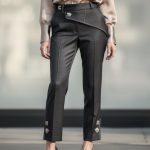Overview of Eco-Friendly Activewear Fabrics
Choosing eco-friendly fabrics for your activewear is not just a trend; it’s a necessary step towards reducing the environmental impact of the fitness industry. The production of sustainable activewear aims to minimize harm to the environment while delivering high-performance fitness clothing. This section explores the significance and benefits of such materials.
A wide variety of sustainable fabrics are being adopted by manufacturers. These include organic cotton, recycled polyester, Tencel, lyocell, hemp, and bamboo. Each provides unique benefits, whether in terms of durability, breathability, moisture-wicking capabilities, or biodegradability. By selecting garments made from these materials, you contribute to reducing resource depletion, pollution, and waste.
Also read : Revolutionary Textile Innovations Shaping the Future of Women’s Fashion in the UK
The activewear industry is a significant contributor to environmental issues due to the traditional methods of fabric production and waste generation. A shift to fitness clothing materials that prioritize sustainability can reduce water usage, lower greenhouse gas emissions, and diminish reliance on non-renewable resources. Brands are now increasingly transparent about their sourcing and production processes, encouraging consumers to make informed, eco-conscious choices in their activewear purchasing.
Types of Eco-Friendly Fabrics
Diving into the world of sustainable fabrics types for activewear reveals a variety of eco-friendly options. Understanding these activewear materials can help consumers make informed choices that benefit both personal fitness and the planet.
Topic to read : The Comprehensive Handbook to Sustainable Activewear Brands in the UK for Conscious Fitness Enthusiasts
Organic Cotton
Organic cotton is a star player in the realm of biodegradable fabrics. Unlike conventional cotton, it is grown without harmful chemicals, reducing environmental pollution. It offers durability and breathability, making it ideal for activewear, while minimizing the ecological footprint.
Recycled Polyester
The production of recycled polyester involves turning plastic waste into valuable fabric. This process helps mitigate plastic pollution and reduces energy consumption compared to creating new polyester. Recycled polyester retains strength and moisture-wicking properties, making it a practical choice for performance gear.
Tencel and Lyocell
Derived from wood pulp, Tencel and Lyocell are environmentally friendly due to their sustainable sourcing and production processes. Known for their softness and moisture-wicking capabilities, they are also celebrated for requiring less water in production, offering a less resource-intensive option for clothing.
Hemp
Hemp stands as a champion of sustainability by being resilient and resource-efficient to cultivate. Its natural antibacterial properties make it suitable for activewear, presenting a strong and durable fabric that supports a low-waste lifestyle.
Bamboo
Bamboo, a notable sustainable fabric, is rapidly gaining traction in the realm of activewear due to its remarkable eco-friendliness. Known for its rapid growth, bamboo can be harvested without the need for replanting, making it an ideal choice for reducing deforestation and habitat destruction.
The transformation of bamboo into fitness clothing materials is a process that emphasizes environmental consciousness. This conversion is achieved using chemical-free methods that ensure the fabric remains biodegradable. Such practices contribute to lowering the carbon footprint associated with traditional fabric production.
Bamboo fabrics are celebrated not only for their eco-friendly properties but also for their exceptional comfort and breathability. The fabric’s natural moisture-wicking capability makes it perfect for activewear, offering a cool, dry experience during intense workouts. Furthermore, the soft texture of bamboo fabric provides enhanced comfort, making it an attractive choice for consumers prioritizing both environmental and personal wellbeing in their garment selections.
By integrating bamboo into their activewear lines, brands are making strides toward more ethical and sustainable fashion, appealing to the growing demand for eco-conscious clothing without compromising on performance.
Evaluating Sustainable Brands
In the quest for eco-conscious clothing, evaluating brands’ sustainability practices is crucial. Understanding the criteria for assessing sustainable activewear brands helps consumers make informed choices. Factors such as materials used, transparency in sourcing and production, and certifications earned are important. The environmental impact of these brands often guides the criteria for sustainable activewear. Among the critical measures are the use of sustainable activewear materials like organic cotton, recycled polyester, and bamboo. A brand’s commitment to ethical production, ensuring fair labor practices and minimal environmental harm, also plays a significant role.
In the UK, several notable eco-conscious clothing companies lead the charge in sustainable activewear. Brands like Finisterre and BAM stand out for their ethical fitness apparel practices. These companies emphasize transparency by openly sharing their supply chain information and sustainability goals, fostering trust with consumers. The ability to track a garment’s journey from raw material to finished product reassures buyers of the brand’s commitment to the environment.
Brands that embrace sustainability in fitness clothing materials not only support ethical practices but also respond to growing consumer demands for eco-friendly options. The importance of transparency cannot be overstated, as it empowers customers to make environmentally responsible purchasing decisions.
Certifications and Standards for Sustainable Fabrics
Understanding sustainability certifications and eco-labels is essential for consumers aiming to make eco-friendly choices in their activewear purchases. These certifications signify that a fabric meets specific environmental and ethical standards, offering reassurance of a brand’s commitment to sustainability.
Global Organic Textile Standard (GOTS)
The Global Organic Textile Standard (GOTS) is a prominent certification for organic fibres. This standard assesses the entire textile production process, ensuring no harmful chemicals are used, and that social criteria are met. For consumers, GOTS certification means the product adheres to high eco-friendly standards, signifying reduced environmental impact and humane working conditions. Brands with GOTS certification, like Pact and Patagonia, offer credible sustainable activewear options.
OEKO-TEX Standard 100
The OEKO-TEX Standard 100 focuses on textile safety, ensuring fabrics are free from harmful substances. This certification provides consumers with an added layer of confidence about the eco-friendliness and safety of their activewear. Recognized brands, including Adidas and H&M, often display this label, emphasizing their focus on consumer safety and environmental responsibility.
Fair Trade Certification
Fair Trade certification ensures fair wages and ethical production processes. Supporting Fair Trade activewear brands helps promote ethical practices and supports producers who adhere to responsible standards. Brands such as People Tree offer reliable Fair Trade activewear options.
The Future of Eco-Friendly Activewear
In the ever-evolving landscape of sustainable fashion, the future of eco-friendly activewear holds exciting possibilities. Emerging trends in both materials and production methods are poised to revolutionize the industry, steering it towards greater environmental responsibility. Advancements in eco-conscious clothing trends are showcasing innovative textiles like algae-derived fibers and lab-grown materials, which promise to reduce the ecological footprint of clothing production.
The role of technology cannot be understated, as it aids the development of sustainable activewear. Technologies such as 3D printing and smart textiles enable manufacturers to reduce waste and enhance the performance of fitness clothing materials. These innovations not only contribute to minimizing resource use but also meet the growing consumer expectation for eco-conscious clothing without sacrificing quality or style.
As consumer demand shifts towards greater sustainability, brands are under increasing pressure to innovate and deliver eco-friendly fabrics. This shift is driven by a heightened awareness of the environmental impact of traditional clothing manufacturing, encouraging both companies and consumers to participate in the movement towards ethical and sustainable fashion. As a result, the industry is moving towards a future where sustainability is not just an option, but a standard.




